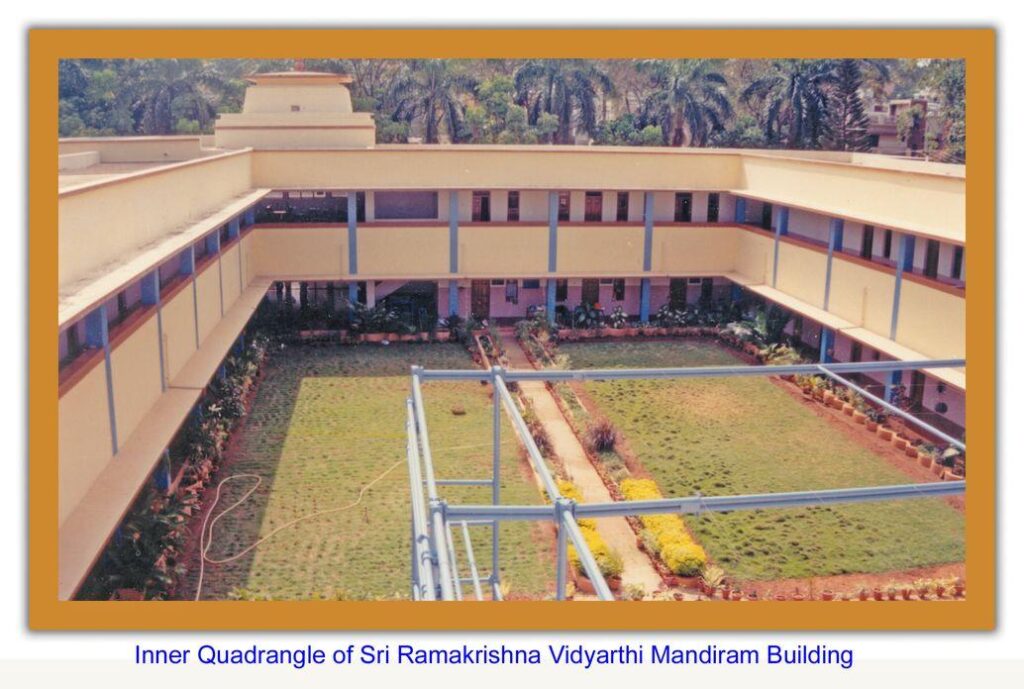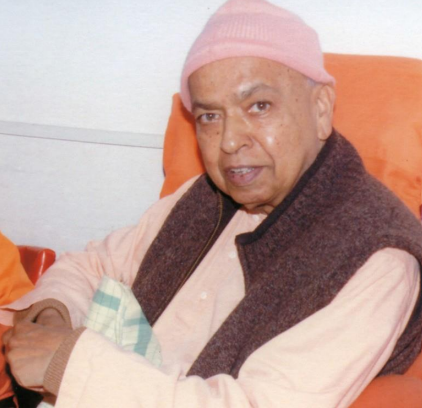After finishing college in Shimoga, I came straight to the Mandiram for higher studies. This was practically my first trip to Bangalore, it was as though I was going to a foreign city such as London or New York. Everything was strange and new. In that bewildering situation, Swami Ritatmanandaji and the small group of twenty students living in the hostel provided a welcome home. It took sometime for me to get used to living with so many people in such close quarters, following a strict routine of prayer, having meals at regular times, taking part in games, etc. One special thing I noticed was how the students and the Swami interacted in an informal way, teasing, joking, arguing. I had my own idea of what a Swami was like-Swamis were aloof creating a sense of awe in their presence. However, in the case of Swami Ritatmanandaji one could freely talk to him. Sometimes students would make sarcastic remarks, taunt the Swami or criticize him behind his back. But Swami Ritatmanandaji was a match for them all he had a deep affection for students though many didn’t recognize it. We students used to have a lot of fun together. Of course, there was a serious academic atmosphere too. Quite a few students passed their examinations creditably. That lively student milieu was there in the Mandiram.

Swami Ritatmanandaji also took us to Swami Tyagishanandaji, the President of the Ashrama, who used to give a weekly class on religious subjects and also private interviews to students. You could ask him any question and he would candidly reply. He had a special interest in students. My admiration for the ideas and ideals that resulted from my contact with the Swamis and the Ashrama gradually became serious, in spite of my occasionally hearing some disparaging comments about them from my hostel mates. The life of renunciation and service started attracting me. The hostel way of living became more meaningful than college studies! About. six months after I came to the Mandiram, I had almost decided to join the Holy Order of Sri Ramakrishna. Swami Ritatmanandaji and Swami Tyagishanandaji imperceptibly facilitated this wish. The result of all this was that I started staying in the Ashrama after a year. This was the first phase of my Mandiram life. Later, after finishing college I formally joined the Order. My grateful salutations to the venerable Swamis for making this happen.
By 1960, the hostel had grown to a hundred students and moved to its own spacious new building. Swami Ritatmanandaji, who had developed some health problems, now needed help to run the hostel and so I (having just become a Swami) was sent there to assist him. And then the fun began. In the first place, I had heard so much about the tricks and practical jokes that students in hostels play on their unsuspecting wardens. In addition, I myself had seen a bit of it while I was a student. So I was very apprehensive to enter this trial by fire! Facing unpredictable students in the dining hall, after prayers, or on the playground was a big effort for me. When I asked revered Swami Yatiswaranandaji, the then president of the Ashrama, what he expected me to do in the hostel, he immediately replied, “Make them feel that you are their friend and give them spiritual ideas.” A tall order indeed! But the Swami’s frank reply cleared my doubts about my role as assistant warden. However, I don’t know how much often Swami’s advice I was able to follow.
Unknowingly the-boys taught me quite a few worthwhile-iessons through all our various encounters. For example, there was one exceptionally intelligent student who was especially talented academically as well as in sports, gymnastics, etc. In my naive enthusiasm I tried to encourage him in the best way that I could. After sometime I noticed that he was tense and rebellious. When I inquired what was the matter, he basically said that I was his problem! It was a shock to me that with the best of motives I had unintentionally hurt him. I found out that good intentions in dealing with people are not enough, some imagination and insight are also necessary.
Further, it gradually became apparent that giving timely encouragement, such as appreciating their proficiencies in a particular area or providing some simple necessities such as a new volleyball or book for the library and so on, can change the prevailing situation for the better. Often while working with students we have to silently swallow their cutting remarks, patiently absorbing their outbursts with understanding. The subjects we heatedly argued about often centered around the different disciplines of the hostel, religion, God, and so on. Students want to be heard; though they know there are no final answers to some basic questions, still they want to express their opinions. And indeed during these discussions some good ideas and suggestions would emerge. So establishing good communication with them requires listening to and genuinely appreciating their point of view, as well as being attentive to their particular needs, physical or psychological.
However, there is another important aspect of my experience too, it gave me tremendous satisfaction and joy to see some students enthusiastically accepting the ideas of Swami Vivekananda’s manmaking education each in his own way. A few gradually developed a deeper interest in prayer and meditation and wholeheartedly responded to the ideal of service; some others in improving their character and personality; some again in building up their’ physiques, and some others in excelling academically in their college studies. A few earnestly and even energetically assisted in the work. It was heart-warming to see them grow in different ways.
Being with students provides so many occasions to learn the Gita ideal of equanimity of mind, nishkama karma, and taking refuge in the divine. Whether everything – is going smoothly or there are difficulties, adjusting oneself to the different temperaments of people requires tremendous energy. To have some peace of mind in this situation, the practice of even- mindness is essential. Otherwise becoming totally exhausted, we burn out. Students come and go, we don’t see the immediate good result of all our hard efforts. In this way, we are given ample opportunities to practice detachment. Furthermore, because of our human limitations we often fail to find solutions to some knotty problems. Becoming helpless under the circumstances, we are made to run to the divine for help and guidance. Every day we learn something new. Never a dull moment! I gratefully remember them for the education they gave me.
Later, in 1964, I was called back to the Ashrama and my contact with the Mandiram was then only from a distance, yet I was in touch with the activities and the functioning of the hostel. I had contact with the boys in different ways. The late Swami Tadrupananda, the warden at that time, who was also a contemporary alumnus, and I used to discuss the issues connected with the students and the general administration. In spite of some seemingly insoluble problems, it was quite invigorating to carry on this service of God in students. Whenever I remember the Mandiram or meet the old students, fond memories of those days cross my mind.
May all blessings of the Lord be on the old and new students of the Mandiram.
Swami Prabuddhananda


Good Article to Know about Mandiram from Swami Prabuddhanandaji Maharaj.
Proud to be a Student of vidyarthi mandiram…
Happy to read this article